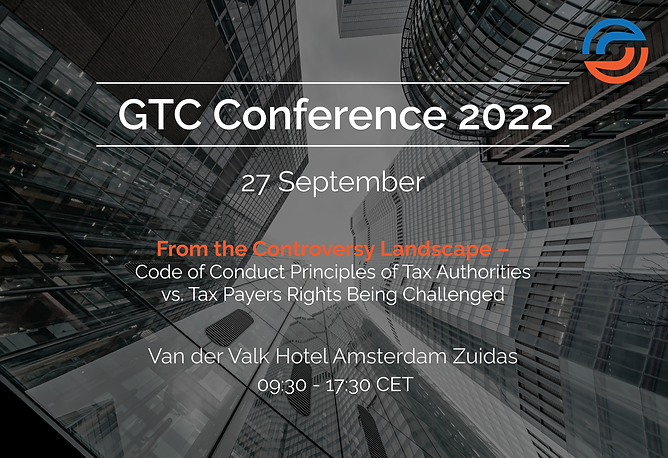GTC Conference 2022
The introduction of BEPS has changed the landscape of international taxation. It brought about not only legislative changes but also politically driven changes that may not be feasible in practice. The aim of this conference is to discuss the overall legislative and political implications and consequences of the BEPS project with reference to taxpayers’ rights.
First, it is important to acknowledge that BEPS is a politically-driven project with the aim of holding multinationals accountable for what is perceived as aggressive and abusive tax avoidance. Although the combatting abusive tax avoidance is of major importance in protecting the tax bases of countries. However, the concern arises that those multinationals are subjected to harsh treatment by tax authorities in practice as a result of the BEPS.
Representatives of various multinationals will come forth to reveal the unethical and unfair treatment they have encountered in practice when dealing with tax authorities. It appears that the behavior of tax authorities has been influenced by the underlying politics. In practice, it is observed that this political element often justifies unethical behavior on the part of tax authorities. The improper treatment of multinationals is justified based on this political backdrop.
In light of this, a discussion on the creation of a code of conduct for tax authorities will be facilitated.
Relating to the above point, the post-BEPS legislative framework imposes unreasonable pressure on multinationals. This is with specific reference to the accumulation of anti-abuse legislation without a natural hierarchy or a central organization orchestrating these various measures. There is no natural hierarchy in the various form of anti-abuse rules – the one rule does not overrule the other and may apply simultaneously”.
The introduction of BEPS changed the way IP structures are set up. Before the introduction of BEPS, one would typically offshore IP in a low tax jurisdiction where royalty taxes are low. The introduction of BEPS Action Plain 8-10 has significantly changed tax planning structures in relation to intellectual property (IP) and many companies are engaging in restructuring activities to meet the BEPS substance requirements.
Lastly, Daniel Erasmus is leading the paper titled “Tax risk register and tax risk committees”. The aim of this paper is to consider the effective management and proactive avoidance of tax risks. It is vital that multinational and medium to small businesses exercise control over this risk by means of a tax risk management (TRM) framework. Some major questions surrounding this theme are:
- Should one have a tax risk committee as a subcommittee of the audit committee?
- Should a tax register be used to track all tax risks?
- What are the ethical and legal implications of the latter two instruments, for example, in light of the Whistleblowers Act?
Time & Location
Time: Tuesday 27. September. 2022, 09:00 – 17:30 CET
Location: Van Der Valk Hotel Amsterdam Zuidas
Price: Free
For more information:
https://www.gtc-global.org/gtc-conference-2022
Mari Sakhechidze, email: m.sakhechidze@tpa-global.com
Tijana Istochka, email: t.istochka@tpa-global.com






